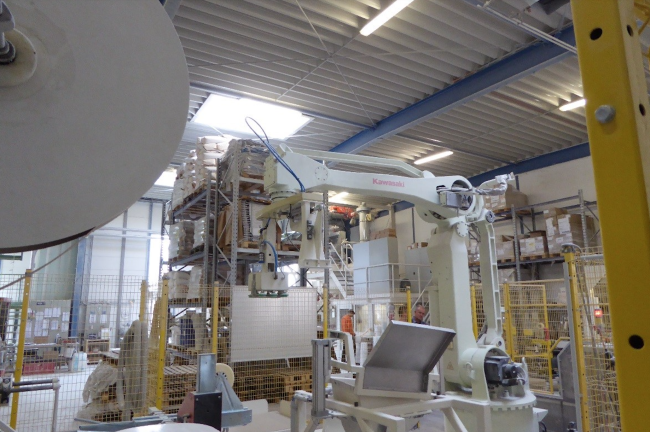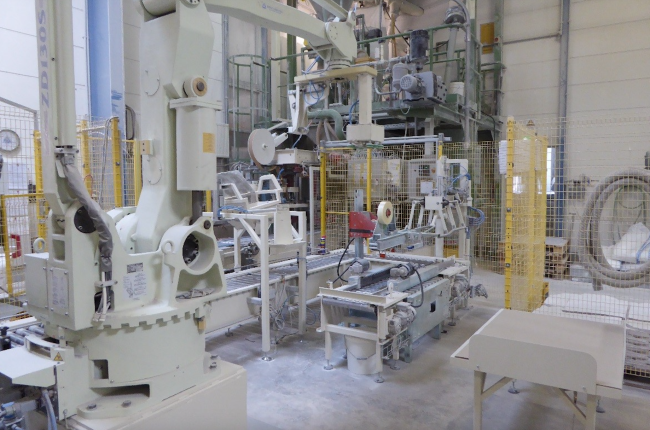3 minute read • published in partnership with Kawasaki Robotics
Case Study: Automated packaging and palletising help increase production for dental plaster manufacturer
For the longest time, using robots at production sites affected by dust formation has been problematic and prone to malfunctions. A Kawasaki ZX-Series Palletizing Robot however has been in problem-free and continuous use in the packaging of dental plaster for more than three years. Since the 1880s ERNST HINRICHS Dental from Goslar in the German Harz Mountains has been developing and manufacturing the first dental impression and model plasters worldwide. From the very start, the company has exclusively been manufacturing products based on high-quality natural and synthetic raw materials from the food industry, without the addition of allergenic substances. This way, a constant demand for these products developed very soon and the necessary expansions followed.
Over the next years, the product portfolio, sales and the company itself grew steadily. Today, ERNST HINRICHS Dental supplies dental wholesalers worldwide and is the international market leader in this industry. Private label manufacturers are being supplied as well, by the subsidiary Siladent and its own product portfolio. A faster delivery to customers, more flexibility, relieving the employees and increasing production sizes made the automatization of the packaging plant for dental plasters necessary. Aside from the palletizing of the final product dental plaster, the entire packaging and palletizing process needed to be fitted to the product.

Picture: Kawasaki Robotics
The Kawasaki system partner Wehling Anlagen- und Maschinenbau (plant construction and mechanical engineering) from the German town of Oschersleben constructed, planned and implemented this demanding project – combined with the challenge of developing a gripping tool which could fulfil three tasks simultaneously without having to perform a time-consuming switch of tools in-between. For this purpose, a multi-function gripping tool was developed and constructed, allowing it to grip bags of varying sizes, bring them into the right form and position them in the finished boxes. The quality of the raw materials not only determines the quality of the final product, but also of the packaging process itself. The entire filling and packaging facility consists of a carton erector, a sagging plant, several conveyor systems, a case sealer and a Kawasaki ZD130S palletizing robot.
Due to the required flexibility of the plant, several products can be processed at the same time – with a minor variation in performance depending on the product category and the product itself. “Working with our client has been an excellent experience and the constant exchange regarding constructive ideas and development has been a major factor in successfully implementing the project”, says Matthias Wehling of Wehling Anlagen- und Maschinenbau.

Picture: Kawasaki Robotics
Special requirements for the packaging process
“Plaster is not plaster”, explains Stefan Schuetze, Head of Procurement at ERNST HINRICHS Dental and responsible for the entire production process. The physical properties determine the choice of raw materials, the production as well as the packaging and palletizing machines. After the dental plaster coming from the sagging plant has been packaged and sealed in 20 kg bags, a Kawasaki ZD130S robot grasps those bags using a multi-function gripping tool and positions them in a box produced by a carton erector. In order to improve the positioning of the bags into the cartons and to avoid pendulum movement which might complicate filling the boxes, the bag is placed into the box along a sliding plate. The Kawasaki ZD130S uses a kind of masher, which compresses the bags in an additional step, to fit the dental plaster bags to the cartons so they can be sealed properly.
Due to the automation shift operation could be reduced: While a three-shift operation was used before the automation, today a two-shift operation has been implemented. With an output of around 120 boxes per hour and 2,000 boxes per day, the plant packages around 40,000 kg dental plaster each day – and has been running smoothly for three years. Handling and operating the robot is very easy and the employees’ satisfaction is very high. “The robot allowed us to increase production significantly and relieve our employees from exhausting physical labour”, explains Stefan Schuetze.
